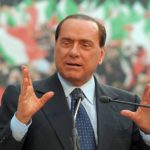The EU needs an administrator for Italy who will not destroy the euro. The deal is pretty obvious; the devil you know is better than the devil you do not.
On November 22, the judges of the European Court of Human Rights meet to evaluate the appeal against the ban imposed on Berlusconi to hold a public office, resulting from the application of a 2012 law (legge Severino) and a subsequent conviction for tax fraud in the 90s based on it. The sentence might come after months, but the consequences of the decision will determine Italian politics for the next few years and EU ones as well.
The last 5 years of Italian politics. Let us consider one question after another:
In the second half of 2011, Berlusconi was driven out of office as the spread between German and Italian bonds was rising to dangerous levels. He was replaced by a strongly pro-EU technocratic government, headed by Monti, (a university professor and former EU commissioner), that implemented harsh austerity measures, making Italy plunge into recession.
The Monti government was initially supported by Berlusconi’s center right and the center-left, a government of “national unity” out of necessity. Berlusconi, however, soon became increasingly critical of the technocrat.
Before the February 2013 election, a first sign of treason emerged. Berlusconi’s party belongs to the “European People’s Party” the center-right of EU politics. But the EPP declared that for the 2013 election, their candidate would be Monti himself, running with a centrist civic list, refusing to endorse Berlusconi.1)Berlusconi brushes off ‘EPP endorsement’ of Monti, Ansa 2013-01-16.
Unfortunately for the EPP, Italians did not digest Monti’s recipe well and his list did poorly at the elections. The winner, the center-left Democratic Party, lacked the numbers to form a government with them too. After multiple consultations, a new quasi-technocratic government was formed led by pro-EU Enrico Letta, with PD being the majority party and Berlusconi’s Forza Italia being the junior one. That’s when the sentence on the tax-fraud, mentioned at the beginning of this article, comes into play. As Berlusconi was sentenced and banned from office, he decided to withdraw his party’s support for the government. The Letta government only survived the crisis because a number of Berlusconi’s MPs left their boss to remain in the government. Berlusconi and the large majority of his MPs joined the opposition.
As more details emerged, including a massive Italian bond sales by Deutsche Bank, currently investigated by the Italian judicial,2)Trani indaga su Deutsche Bank per le mosse sui Btp italiani del 2011, La Repubblica 2016-05-06.as it might have caused the “spread crisis” of 2011, Berlusconi became convinced that his removal was not out of economic necessities, but simply a coup orchestrated by the then French President Sarkozy, Angela Merkel, EU officials and the ECB to save the euro currency and force Italy to adopt austerity measures.3)Italy’s Berlusconi says was forced from office by EU ‘plot’, Reuters 2014-05-14.
The Letta government was replaced in 2015 by the (then) rising star of Italian politics, Renzi; but the Renzi experience turned out to be a gigantic failure: remuneration in vouchers, precariat, and a crisis of illegal immigration caused by NGOs smuggling migrants across the Mediterranean, convinced Italian voters that Renzi could not deliver anything on his promise. By 2016, Renzi called for a Constitutional referendum at the end of the year, betting his political destiny on the result: as soon as he did, opinion polls on the referendum turned against him, and he was routed in December of the same year, paving the way for the current Gentiloni government until new elections in 2018.
The devil you know…
Renzi was the last failure of pro-EU politicians in Italy. Pro-EU options have run out. After an initial triumph at the European Parliament elections in 2014, Renzi has collected nothing but defeats. Since the December 2016 referendum, the Democratic Party was soundly beaten in both regional and local administrative elections. EU leaders have lost faith with him. And that’s where Berlusconi comes handy.
In the last few months, the eighty-two-year-old billionaire has started sending signals to the EPP, which “betrayed” him for Monti. His campaign for 2018 has insisted on “moderate” positions against the extreme “populism” sweeping the West. His approach, given the polls, seems delusional at best. Excluding the votes lost to micro-parties, half of the Italian electorate will vote for “populist” Movimento 5 Stelle or right-wing Lega.
EU leaders have been presented with 4 choices: Renzi with his proven inability to achieve anything, Salvini of Lega with his anti-euro and anti-immigration positions, Di Maio of M5S representing the unknown and finally old Berlusconi.
The devil you know is better than the devil you do not; we can finally close the circle about the ECHR sentence. Berlusconi needs a favourable sentence to fully return to politics, which would give him temporary immunity to the many trials pending. The EU needs an administrator for Italy who will not destroy the euro. The trade is pretty obvious. Will it happen before the next general election? Will it be enough?
There’s an ongoing rumour: ECB president Draghi will become available at the end of 2019 when his mandate expires. You could see an attempt to repeat the Monti experience of 2011-12, with the center-right of Berlusconi and the center-left of Renzi backing the central banker for another technocratic run. As it is right now, however, unlike a few years ago, not enough Italians will vote for center-leaning parties to allow that.
References
| 1. | ↑ | Berlusconi brushes off ‘EPP endorsement’ of Monti, Ansa 2013-01-16. |
| 2. | ↑ | Trani indaga su Deutsche Bank per le mosse sui Btp italiani del 2011, La Repubblica 2016-05-06. |
| 3. | ↑ | Italy’s Berlusconi says was forced from office by EU ‘plot’, Reuters 2014-05-14. |




